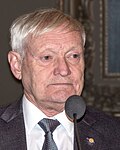Prizes
Physics
| Awardee(s) | ||||
|---|---|---|---|---|
 | Rainer Weiss (b. 1932) | "for decisive contributions to the LIGO detector and the observation of gravitational waves" | [4] | |
 | Kip Thorne (b. 1940) | |||
 | Barry Barish (b. 1936) | |||
Chemistry
| Awardee(s) | ||||
|---|---|---|---|---|
 | Jacques Dubochet (b. 1942) | "for developing cryo-electron microscopy for the high-resolution structure determination of biomolecules in solution" | [5] | |
 | Joachim Frank (b. 1940) |
| ||
 | Richard Henderson (b. 1945) | |||
Physiology or Medicine
| Awardee(s) | ||||
|---|---|---|---|---|
 | Jeffrey C. Hall (b. 1945) | "for their discoveries of molecular mechanisms controlling the circadian rhythm" | [7] | |
 | Michael Rosbash (b. 1944) | |||
 | Michael W. Young (b. 1949) | |||
Literature
| Awardee(s) | ||||
|---|---|---|---|---|
 | Kazuo Ishiguro (b. 1954) | "who, in novels of great emotional force, has uncovered the abyss beneath our illusory sense of connection with the world" | [8] | |
Peace
| Awardee(s) | ||||
|---|---|---|---|---|
| | International Campaign to Abolish Nuclear Weapons (founded 2007) | "for its work to draw attention to the catastrophic humanitarian consequences of any use of nuclear weapons and for its ground-breaking efforts to achieve a treaty-based prohibition of such weapons." | [9] | |
Economic Sciences
| Awardee(s) | ||||
|---|---|---|---|---|
 | Richard Thaler (b. 1945) | "for his contributions to behavioural economics" | [10] | |